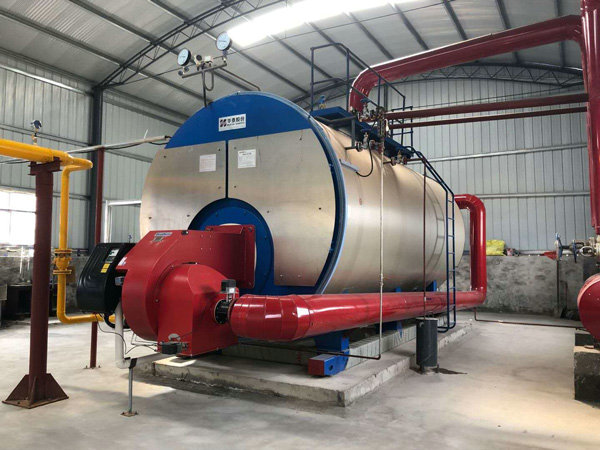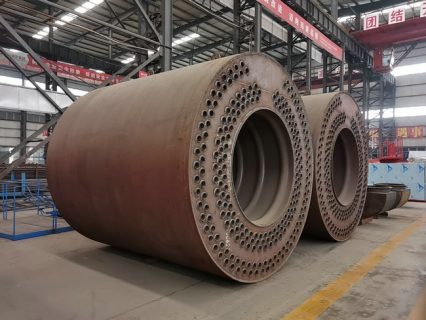Asphalt is a material that is commonly used for paving roads and other surfaces. In order to melt asphalt, it must be heated to a high temperature. One way to do this is with a fire tube boiler.
A fire tube boiler consists of a series of tubes that are placed in a firebox- or named boiler body. The firebox is typically filled with burning fuel, such as natural gas, diesel, or wood. The heat from the burning fuel passes through the tubes and heats the asphalt. This process melts the asphalt so that it can be used for paving.
The working principle of fire tube boilers:
Heat from the burning fuel passes through the tubes and heats the asphalt. This process melts the asphalt so that it can be directly put on your buyer’s car and sold to the project on-site.
No need to use an asphalt mixer and the working principle is very easy to understand, just like a water boiler. The only difference is that this time the heating material is asphalt instead of water.
Asphalt Melting Boiler Design:
The asphalt melting boiler is horizontal type fast installed fire tube diesel/gas boiler, the combustion equipment is a wave furnace.
Fire tube boilers are usually used for relatively small steam capacities and lower operating pressures.
The general construction is as a tank of water penetrated by tubes that carry the hot gases of combustion through the water. The water surrounds the tubes and these, in turn, surround the furnace.
Fire Tube Boiler Operation:
Fuel oil (or natural gas) is burned in a wave furnace and hot gases produced pass through a bank of tubes. These tubes are submerged in the water contained in the shell of the boiler.
The flame heated the furnace, transfer the heat to the furnace, and traveled in the fire tube boilers. It will indirectly heat those waters inside the boiler body. Finally, it transfers the hot water into steam and goes outside to melt the asphalt. The melted asphalt is then collected in a tank and can be used immediately or stored for later use.
The fire tube boiler is a mature technology that has been used for many years. It is still in use today because it is a simple and reliable way to melt asphalt. If you are looking for a more efficient way to melt asphalt, you can check more with the boiler supplier to get suitable type.
Is It A 3 Pass Fire Tube Boiler?
A fire tube boiler is commonly constructed with 3 passes, each of which contributes to increasing the surface area of the heat exchanger and, as a result, improving heat transmission.
This 3-pass fire tube boiler employs three passes to heat the water as it flows through the boiler. The method is more efficient than a standard fire tube boiler, which uses just one or two runs.
Our 3-pass design significantly improves heat transmission, allowing the boiler to run at greater temperatures while being safe. Furthermore, the 3-pass fire tube boiler is less prone to fireside issues such as corrosion and deposits. As a result, this boiler is frequently the chosen option for industrial and commercial applications.
Why Should I Use Fire Tube Boiler On Asphalt Melting?
This type of boiler is often used in construction asphalt melting because it is very efficient and can produce a lot of heat.
A fire tube boiler is a type of boiler in which hot gases from a fire pass through one or more tubes within a sealed container of water. The heat from the gases is transferred through the walls of the tubes by thermal conduction, heating the water and creating steam.
Fire tube boilers are commonly used in construction, asphalt melting, and other applications where large volumes of water need to be heated quickly. When used in construction, fire tube boilers are often used to provide hot water for radiant floor heating systems.
Asphalt melting is another common application for fire tube boilers, as the high temperatures required for melting asphalt can be easily achieved with this type of boiler. In both applications, fire tube boilers are able to provide a large volume.
How Is The Working Life Of The Fire Tube Boiler?
It is important to ensure that the fire tube boiler is properly maintained so that it can continue to operate efficiently and for a long period. It typically has a service life of 20-25 years.
It is critical to keep a fire tube boiler in good operating order. The boiler should be examined on a regular basis for any signs of damage or corrosion.
Any leaks should be fixed as soon as possible. To avoid the accumulation of soot and ash, the fire tubes should be cleaned on a regular basis. The water level in the boiler should be monitored on a regular basis and topped off as needed. Furthermore, it is critical to drain and clean the system on a regular basis.
By following these easy guidelines, you can ensure that your fire tube boiler will continue to function properly.
It is also important to pay attention to the pressure in the boiler within the recommended range. Regular maintenance will help to extend the life of the boiler and keep it operating safely and efficiently.

